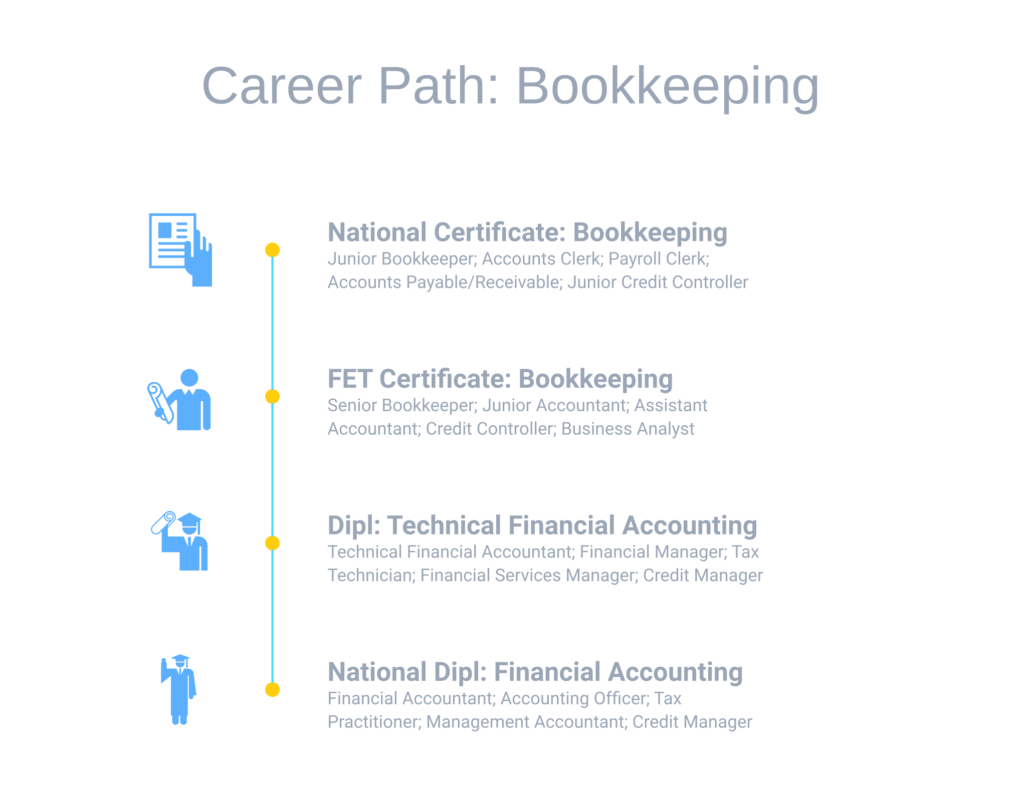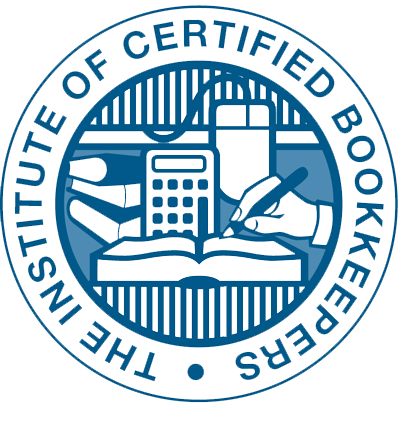Would you like to apply for Accounting courses via Home Study? Here is your complete list of ICB recognized accounting and bookkeeping courses:
| NQF Level | ICB Programme Level | Qualification |
| NQF L3 | Foundation Level | National Certificate: Bookkeeping |
| NQF L4 | Intermediate level | Further Education and Training Certificate: Bookkeeping |
| NQF L5 | Upper Intermediate level | National Diploma: Technical Financial Accounting |
| NQF L6 | Advanced Level | National Diploma: Financial Accounting |
The difference in between Bookkeeping and Accounting
Do you want to apply for accounting courses via home study, but not sure what the difference is between Accounting and Bookkeeping? Well they are 2 sides of the very same thing. At the entry level, it is called bookkeeping. In bookkeeping, you are dealing with the accurate recording of all the offers of a business or department. You make specific that revenues an all cost are correctly tape-recorded.
When you have in fact moved a couple of actions up on the ladder, you begin reporting on the bookkeeping details, and you start evaluating the info. At the level where your job becomes more complex since you are likewise reporting and assessing company financial details, we start calling it Accounting.
So an Accountant is a senior Bookkeeper. And a Bookkeeper is a junior Accountant!
Why apply for accounting courses via home study?
In South Africa, bookkeeping and accounting are scarce skills. That implies that both market and government recognise that we have a scarcity of accountants and accountants. The federal government body for certifications in the monetary sector, FASSET, has done a study on scarce skills in 2015. From that study, they published their Scarce Skills Guide 2015.
FASSET is the SETA for Finance, Accounting, Management Consulting and other Financial Services. In their scarce skills direct they recognized the following as scarce skills:
- Student Accountant
- Financing Manager
- General Accountant
- Accounts Clerk
- Payroll Clerk
- Debt Collector
These are all positions for which an ICB accounting course will prepare you appropriately. Your accounting accreditation will ensure that you are continuously in demand. It is a wonderful profession that can take you to the highest level in an organisation.
So why apply for accounting courses via home study ? The scarcity of accounting skills also impacts government departments. All government departments have accounting and accounting divisions. And they work every year to obtain an effective audit. To obtain a clean audit implies that they need experienced, licensed, dedicated and experienced accounting and accounting personnel and managers.
As a qualified accountant or accounting professional, you will continuously stay in need. Either in private company or in a federal government department, which can consist of both towns, along with bigger nationwide federal government departments.
Can I apply for accounting courses via home study if I do not have a Matric Certificate?
Yes, you can apply for accounting courses via home study without Matric.
All the ICB courses begin at NQF level 3. And they increase to NQF level 6. In comparison, matric is at NQF level 4. So these courses are readily available for a trainee who do not have matric. Students begin at a level listed below matric. Keep studying the program, and course by course you will rise up the NQF level 6, which is 2 levels higher than matric.
The ICB has developed their courses to assist students who did not total school, and who has to work and study at the exact same time. So you begin with the easy concepts and work, and construct on that foundation, till you are eventually an expert!
As a home study student, you can study an hour after work, 3 or 4 times per week. With five assessment opportunities in 2017, you understand that as quickly as you are prepared, you can register for the next examination.
This is how you build up your accreditations; action by step
As you advance through the program, you will get recognition at the numerous levels. After ending up the very first 4 topics, you will get your first qualifications from FASSET, and your first ICB Programme Certificate.
ICB Bookkeeping and Accounting Courses
The ICB bookkeeping and accounting program is made up of 4 different levels. Inside each level can be one or more courses.
- Foundation Level
- Intermediate Level
- Upper Intermediate Level
- Advanced Level
As you total each level, you will get certified by the ICB. You will get an ICB Certificate. As you complete the different courses inside the levels, you will get recognition from FASSET in the form of your formal certification from FASSET.

Foundation Level
Wish to study to end up being a Junior Bookkeeper?
Our ICB National Certificate in Bookkeeping course is perfect for students who wish to operate in a junior accountant position. This course includes four topics and will take sixteen months to complete. In order to study this course, you have to be at least sixteen years of age and have a grade 10 certificate. No prior accounting or accounting understanding is required.
National Certificate: Bookkeeping (NQF Level 3) – Foundation Level
The foundation level is the starting point for lots of trainees. If you did not do that well at school, or you stopped attempting matric, or you have in fact not studied for various years, then the foundation level assists you bridge the space and return into studying.
Academically the level is NQF 3. That is the level listed below matric, so we understand that trainees with Grade 10 (Standard 8) will be able to handle the scholastic level of the work.
You do not require any previous accounting or accounting knowledge if you begin at this level. And you require being at least 16 years of age to be accepted into the program.
To complete this level you need to pass 4 topics. The suggested time to complete this level is 12 months. Distance learning students can take up to 18 months.
Intermediate Level
Wish to study to become a Senior Bookkeeper?
The ICB Further Education and Training Certificate in Bookkeeping course will prepare you for a senior bookkeeper position. The entry requirement for this course is a National Certificate in Bookkeeping. The study duration for this course is six months and there are only 2 subjects to complete.
FET Certificate: Bookkeeping (NQF level 4) – Intermediate Level
The intermediate level is for students who have successfully completed the foundation level. It is your 2nd action on the ladder to becoming a Financial Accountant.
To enter this level, you must have passed the foundation level. That indicates you ought to currently have your National Certificate: Bookkeeping to enter this level.
To complete this level you have to pass 2 topics. Many students complete this level in six months. Distance learning students can utilize up to 9 months to complete this level.
Upper Intermediate Level
Want to study to end up being a Technical Financial Accountant?
To end up being a qualified technical financial accounting professional, you must study the ICB National Diploma in Technical Financial Accounting course. In order to study this bookkeeping course, you first need to acquire a Further Education and Training Certificate in Bookkeeping. This course takes about six months to finish and there are 2 subjects to work through.
National Diploma: Technical Financial Accounting (NQF level 5) – Upper Intermediate Level
At this level, you move from Bookkeeper to Accountant. If your dream is to wind up being an Accountant, then this level will get you there!
To enter this level you have to have passed the Intermediate level. That indicates you should have your FET Certificate: Bookkeeping to acquire entry to the Upper Intermediate Level
To complete this level you have to pass 2 subjects. The recommended time of study is 6 months. Home Study trainees can utilize up to 9 months to complete this level.
Advanced Level
Want to apply for accounting courses via home study and become a financial accountant?
If you are dreaming about running your very own bookkeeping/accounting practice, you must study the ICB National Diploma in Financial Accounting. You need a National Diploma in Technical Financial Accounting to study this course. You will have to finish three subjects in the duration of nine months.
You could also study the general public Sector National Diploma in Financial Accounting course to acquire a monetary accountant designation. Nevertheless, you initially have to finish the National Certificate in Public Sector Accounting and Diploma in Public Sector Accounting course prior to you can proceed to the monetary accounts course. This course will also take 9 months to finish.
National Diploma: Financial Accounting (NQF level 6) – Advanced Level.
This is the greatest level of ICB research studies. Here you will get your National Diploma: Financial Accounting (NQF Level 6). To enter this level you need to have passed all the previous levels. So that suggests you have to be in ownership of your National Diploma: Technical Financial Accounting.
To pass this level you need to successfully complete four topics. Students usually take around 12 months to complete this level. Distance learning students can take a bit longer, clearly.
ICB Correspondence Colleges – Accreditation
Being fully acknowledged methods that the college has actually looked for accreditation to the Institute of Certified Bookkeepers. After sending a portfolio of documents to substantiate the application, each college is gone to by a quality control supervisor from the ICB. At the college website a range of things are inspected, to make sure the college is successfully able to use these ICB courses.
A few of the important things a college ought to show at a website assessment from the ICB are their financials, quality study materials, proper systems and processes to offer distance learning, certified personnel, a tax clearance certificate and an OHS certificate to reveal that the college is safe for staff and students.
After successfully passing the website examinations, these colleges got their accreditation from the ICB. That implies they have an accreditation certificate for each ICB programme that they are acknowledged to supply.
ICB Learner Portal
The ICB has a student website for home study trainees. Through the ICB student website, you can access a range of self-service functions. You can likewise ask your college to gain access to these functions in your location if you do not have internet access to, or if you have a hard time to utilise the portal.
A few of the important things you can do through the learner portal are:
- View and edit your individual and contact information
- Order a reprint of a certificate you accomplished
- Pay your ICB costs (Credit Card).
- Register for Exams.
- See your Exam Results.
ICB Bookkeeping Courses Fees.
There are a number of various costs that you need to plan for if you are going to apply for accounting courses via home study. Here are a few of the major costs you have to comprehend and prepare for:.
- Study costs with your distance learning college.
- Textbook charges. Some colleges will include this in your course fees.
- Courier charges. Skills Academy includes this in your course charges.
- Test costs. Generally, you pay this directly to the ICB, so it is not included in your course fees.
- ICBA Student Membership charges. These fees are generally not included in your course costs.
- ICB Student Registration fees. This is an annual fee that is usually not consisted of in your course charges.
ICB Registration.
When you choose to apply for accounting courses via home study an ICB qualification, you have to remember a number of things that type part of your ICB Registration, being:.
- Yearly ICB Student Registration.
- Registration with a home study college.
- ICB Exam Registration.
- ICB Exams.
The ICB offers 5 test sessions to home study trainees in 2017. You need to ensure you comprehend the test costs. And it is seriously important that you register for your test, 3 months before you prepare to write the examination.
You can not reach the exam centre and anticipate a seat and an exam paper if you have actually not signed up for that exam.
Last Updated: 19th June, 2017
